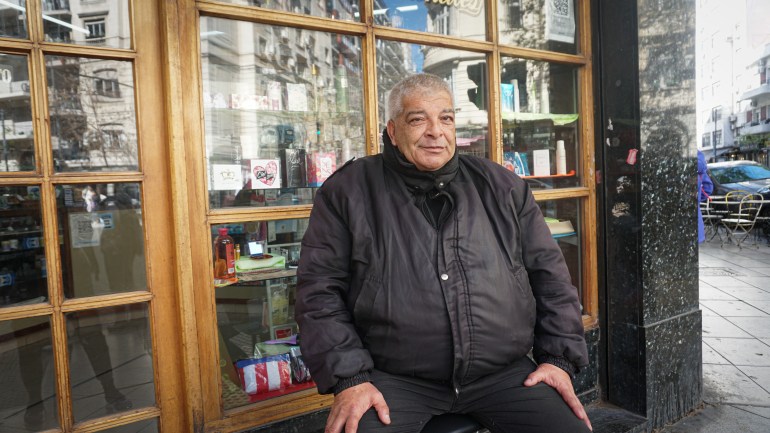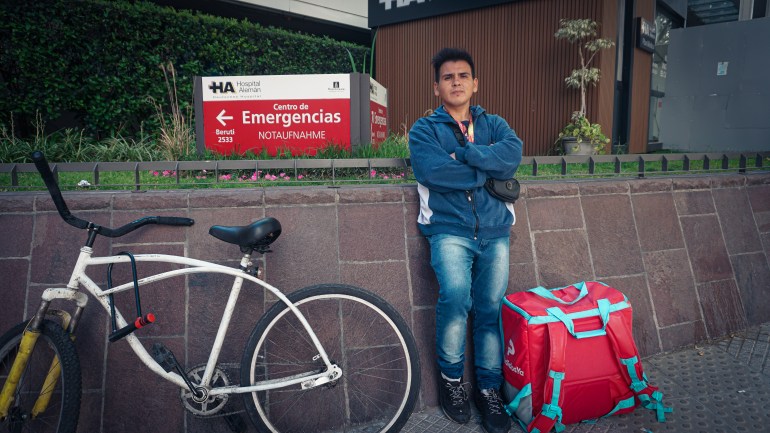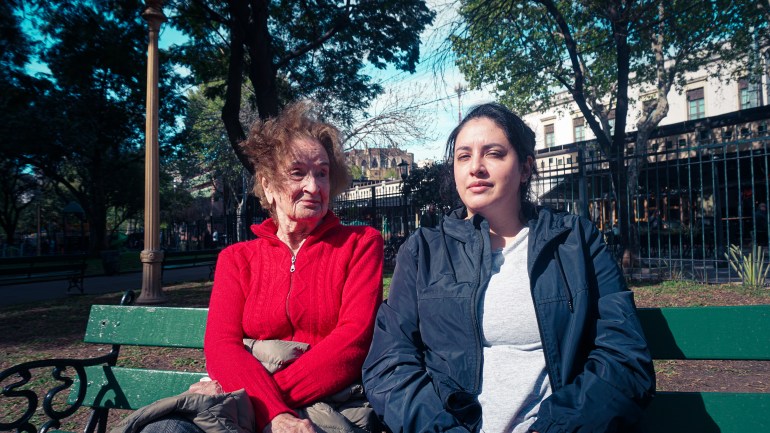‘Nothing changes’: Argentine voters express exasperation ahead of elections
In the wake of Argentina’s first 2023 presidential debate, voters weigh in on the economy, abortion and Javier Milei.

Buenos Aires, Argentina – It was a “superclásico” kind of Sunday last weekend in Argentina, with more than one kind of high-profile match-up capturing the public’s attention.
On the same day that rival football teams Boca Juniors and River Plate faced off on the pitch, five political giants likewise collided in the first of two televised debates ahead of Argentina’s presidential elections. The first round of voting is scheduled for October 22.
Keep reading
list of 3 itemsArgentina’s President Fernandez will not seek re-election
What’s behind Javier Milei’s election win in Argentina?
Much of the focus on Sunday was on one candidate in particular: Javier Milei, 52, a far-right libertarian economist who netted the most votes in August’s primaries, delivering a stunning rebuke to the political establishment.
With nearly 30 percent of the primary vote, he prevailed over Patricia Bullrich, the candidate for the centre-right coalition, and Sergio Massa, the economy minister representing the ruling centre-left coalition.
With annual inflation skyrocketing to 124 percent and the value of the local currency dropping every week, experts say Milei’s lead shows a desire for something different among the Argentine electorate.

Milei has positioned himself as the outsider who can overhaul the system — and has subsequently become the candidate to beat.
His promises to ditch the Argentine peso in favour of the United States dollar and scrap the country’s central bank have fuelled his popularity. Public opinion polls continue to show him in first place.
But his controversial platform and public persona could spark a backlash. In recent months, Milei has garnered criticism for bashing Pope Francis as a “disgusting leftist”, pushing to privatise public education and downplaying the horrors that occurred under Argentina’s military dictatorship, from 1976 to 1983.
Al Jazeera caught up with voters after the debate to talk about the issues that mattered most to them — and which candidates caught their eye.

Paula Galdame, 22, obstetrics student from La Plata, Buenos Aires province
[Explaining her opposition to Milei and his criticism of abortion rights and sex education.] “I wouldn’t vote for any politician who wants to put our rights at risk, who wants to take away a lot of the things that we have won.
“I feel it like a threat because something very important is in jeopardy: the right to an abortion, the rights of communities, the right to sex ed.
“I think there are a lot of parties that are taking a lot of liberties and spreading misinformation, which ends up drawing out a lot of people.
“But there are a lot of things that they actually can’t do. So even if the intention is there or the intention isn’t a bad one, there are realities that just don’t make it possible. For example, like dollarisation [the process of using the US dollar as national currency]…
“So we end up talking about things that can’t end up happening.”

Roberto Clavero, 66, pensioner and pharmacy security guard from Buenos Aires
“The most important thing that the government has to do is bring in more security, because it’s impossible to move around the province of Buenos Aires or the capital city. There needs to be more law enforcement. And all the people who are living on the street: There is so much poverty. They sleep outside and eat from the garbage bins.
“And then there’s the poor pensioners who have worked their whole lives and are earning a pittance.
“I keep working because I have to keep working.”

David Diaz, 21, food delivery worker from Merlo, Buenos Aires province
“I’m voting for Milei. He’s the only one who is different. As long as I’ve been alive, we’re always in the same situation, and nothing changes. We have to go for something different.
“[I’m worried about] inflation. Every day, my salary is worth less. It’s not enough for anything. I used to work in construction, almost as a full-time employee, but it wasn’t enough. The price of things would go up, but my salary wouldn’t. So I had to start running deliveries. I have to kill myself working a bit more, but at least I earn enough.”
[Explaining what he likes about Milei’s economic agenda.] “Less subsidies, less ministries, less public spending.”

Nilda Baez, 33, elder-care worker from La Matanza, Buenos Aires province
“There’s like this feeling of resignation — mine and also people in general.
“It’s like, no matter who wins, we’re in this situation. There isn’t any faith that any of the candidates can actually get the country out of this. It’s like: I don’t want the guy [representing the party] that already won to win again, and this other guy [Milei] scares me.
“So I pick Bullrich, who at least scares me the least, but it’s not like I actually have hope that anything will change. At least, not in the near future.”

Lucila Miramontes, 47, social worker and university professor from Buenos Aires
“I am going to vote, without a doubt, for Massa because he brings together a whole trajectory of an entire process of historical reconstruction that we have been going through in these 40 years of democracy.
“And especially, facing the abyss that we find ourselves in, I think that he is the one who is challenging us to keep rebuilding ourselves with hope and, above all, the processes of memory, truth and justice anchored in the perspective of human rights.”